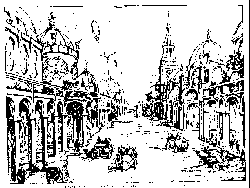 (Boston in the year 2000, 1900)
(Boston in the year 2000, 1900)
West, the main character, falls asleep on May 30th, 1887, and wakes up 113 years later. A guide appears from nowhere and explains to him everything he should know. Dr. Leete, West's guide, shows him the main characteristic of a technological utopia: everyone works for the "industrial army" until they reach 45. After that they are discharged from work. Is it possible to refuse participating in the "army"? Leete says, "a capable man who refuses to work, is sentenced to solitary confinement and fed with bread and water until he agrees to cooperate". What does West think about it? "With sorrow in our hearts for the gloomy past, let us look at the wonderful future, protect our eyes, and continue our journey. The long and severe winter of mankind is over. It is summer time. Mankind has hatched the chrysalis. Heaven is before you." This idea led to the establishment of 150 Bellamy clubs in the US, as well as in other countries. As a response to this, two other fiction works appeared: "News from Nowhere" (1890), by William Morris (an anti-technological utopia) and "Story of the Times to Come" (1897), by H.G. Wells (a technological anti-utopia).

